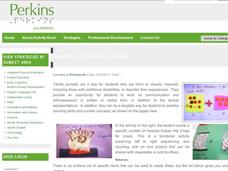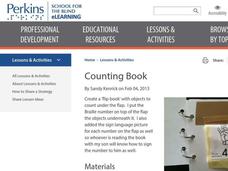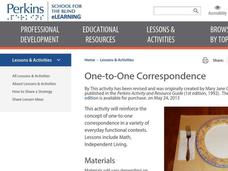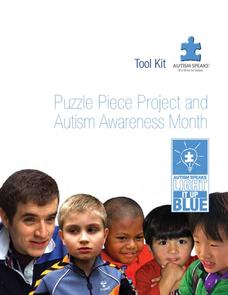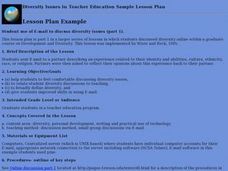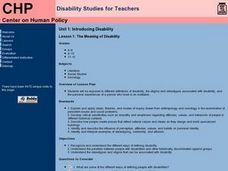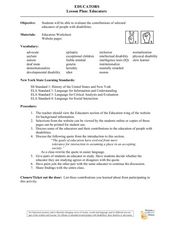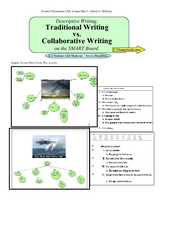Perkins School for the Blind
Wheel of Fortune Game
Games are great for practicing any number of basic skills. Here is a set of wonderful instructions for making a braille version of a spinning game, where children win points by correctly reading/identifying the high-frequency words the...
Perkins School for the Blind
Planning a Special Event
I love planning parties, they are a great way to get social, require organizational skills, and engage cooperative problem solving. Teens with visual impairments put their heads together to plan an event for their friends. They choose an...
Perkins School for the Blind
Counting in Tactile Journals
This is one of those great ideas I totally love. Youngsters with visual impairments practice counting and left-to -right sequencing by counting out a set number of edible objects from the left and putting them in a bag on the right. They...
Perkins School for the Blind
Eating Out
Going out to lunch, reading a menu, making choices, and spending time socializing are all parts of growing up. Teens with visual impairments use several braille menus from local restaurants to practice ordering and appropriatelyeating...
Perkins School for the Blind
Baseball
Baseball is an American pastime, super fun to play, and can be made accessible to learners with visual impairments. Instead of taking to the ball field, your class can learn the rules of the game by playing a small three-dimensional...
Perkins School for the Blind
Packaging Snacks
Have your learners with special needs practice cooperative work skills, teamwork, and packaging. The kids will form an assembly line. Each pupil will add an item to a paper bag and then hand it off to the next person until the bag is...
Perkins School for the Blind
I'm Thinking Of...
Learning how to describe an object or a person is a great way to develop verbal and written expression. Learners with special needs improve their verbal expressive skills and concept development skills while playing a guessing game. The...
Perkins School for the Blind
Where Shall I Put It?
Position and positional phrases are concepts that need to be constructed for learners with low or no vision. Help them gain competence and a conceptual understanding of words like on, in, and under with a funny game. After gathering a...
Curated OER
Daily Helper Schedule: Template
I wish I had thought of this! This schedule provides a place to put an image of a different person for each day of the week and frame for the person the child will be working with that day. Initially intended to assist an Autistic pupil...
Perkins School for the Blind
Grocery Shopping
Grab those reusable bags, it's time to go shopping! Intended to foster independent living skills in learners with visual impairments, the instructional activity covers several topics related to grocery shopping. They start by planning a...
Perkins School for the Blind
Counting Book
Here is a wonderful way to teach children with visual impairments how to count and build number recognition skills. Included, you will find a set of instructions on how to create a counting book from card stock, jump rings, and cotton...
Perkins School for the Blind
One-to-One Correspondence
Here is an interesting way to build concept understanding regarding one-to-one correspondence. Learners with visual impairments will use an array of everyday objects in context to foster an understanding of what one-to-one correspondence...
Perkins School for the Blind
Name That Frequency
How cool! This plan uses old cassette tapes to show frequency from traveling vibrations. To prepare for the lesson, tactile frequency diagrams are made and then placed near the video tapes or dominoes that are already set up. When they...
Perkins School for the Blind
The Printing Process
The printing process was a technological innovation that revolutionized the modern world. Your learners with visual impairments can experience this process by creating a print by using letterpress printing. They use cardboard, glue, and...
Curated OER
Sneetches: Diversity of Learners
For Learners wanting to practice verbal/linguistic intelligence, any Dr. Seuss book is an excellent text for examining rhyming words. They explore words that rhyme with bully, mean, snooty, nasty, tease, harass, hurt.
Curated OER
My Habitat
Students explore the environment they live in. In this habitats lesson, students define habitat and create a web in kidspiration. Students take a walk outside and record what they see and hear and may take pictures as well. Students...
Curated OER
Home Living / Daily Living Lesson Plan—Mastery Healthy Food
Everyone needs to know how to eat well to stay healthy. Learners with mild disabilities log what they eat, discuss food choices, and review healthy foods. The lesson could be used to foster living skills in high-functioning individuals...
Autism Speaks
Puzzle Piece Project and Autism Awareness Month
Looking for ways to include your class members in Autism Awareness Month? Use a packet that provides several opportunities to include the student body in an important campaign.
Curated OER
Five "E" Lesson-Stereotypes
Students discuss the nature of stereotyping and prejudicial behavior and their feelings regarding people with visible disabilities. They view part of documentary Graduating Peter then work in groups to chart people's reactions and...
Curated OER
Diversity Issues in Teacher Education
Students send E-mail to a partner describing an experience related to their identity and abilities, culture, ethnicity, race, or religion. Partners then reflect their opinions about this experience back to their partner.
Curated OER
The Meaning of Disability
Students discover the different types of disabilities. They examine the stereotypes and stigmas associated with them and hear from a person who lived in an institution.
Curated OER
The Senses: Hearing and Sight
Eighth graders consider how they use their senses. In this biology lesson plan, 8th graders understand the definition of a disability and how it affects Americans who are hearing impaired or deaf, and those Americans who are visually...
Curated OER
Educators
After viewing selections from a website and discussing the role of the teacher in educating the disabled, students work in pairs. They analyze the work of an educator and relate the work to a given quote, then decide if that quote fits...
Curated OER
Traditional Writing vs. Collaborative Writing
Students examine language arts by completing a group activity. In this writing styles lesson, students define and discuss the differences between collaborative writing and traditional writing while answering questions in a Smart Board...




